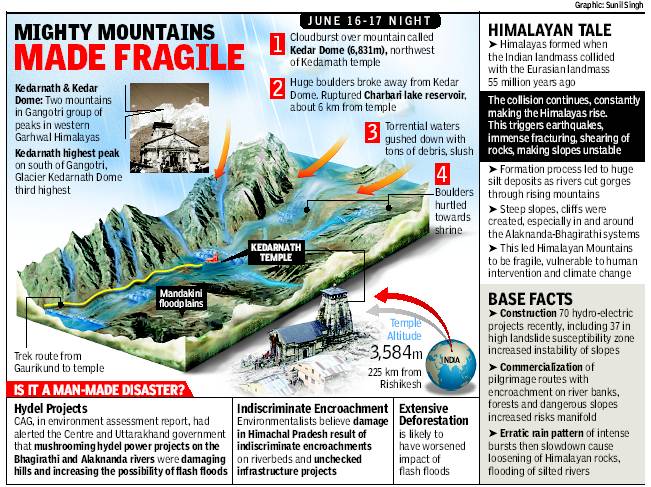Kedarnath
(Created page with "{| class="wikitable" |- |colspan="0"|<div style="font-size:100%"> This is a collection of newspaper articles selected for the excellence of their content.<br/>You can help by ...") |
(→Temple unscathed by 2013 cloudburst tragedy) |
||
| Line 27: | Line 27: | ||
Until a few decades ago, a visit to Kedarnath was considered hazardous enough for people to start for the pilgrimage early morning and return by late afternoon, said Uniyal. | Until a few decades ago, a visit to Kedarnath was considered hazardous enough for people to start for the pilgrimage early morning and return by late afternoon, said Uniyal. | ||
| + | [[File: kedarnath.jpg|A major ecological tragedy took place in June 2103. This chart indicates the issues.|frame|500px]] | ||
==Temple unscathed by 2013 cloudburst tragedy== | ==Temple unscathed by 2013 cloudburst tragedy== | ||
Shrine statues,Nandi still intact | Shrine statues,Nandi still intact | ||
Revision as of 14:31, 22 June 2013
This is a collection of newspaper articles selected for the excellence of their content. |
Kedarnath: climate/ cloudbursts
Cloudburst on Kedar Dome no freak event
TIMES NEWS NETWORK
New Delhi: The June 16, 2013 cloudburst over Kedarnath, or to be exact over the mountain peak called Kedar Dome which stands at 6,831m,cannot be called a freak climatic phenomenon. Since 1998,the frequency of such heavy, concentrated rainfall over a short period has increased. Ukhimath witnessed the phenomenon in 1998,followed by a series of such events in 2002 in Phata in Mandakini Valley,Khedgaon in Kumaon,and Agunda in Bhilangar Valley.In 2003,Tehri,too,saw such abnormally high rainfall,as did Ladakh in 2010 which triggered mudslides leading to 255 deaths.
While cloudbursts are a natural hazard, our approach to development increases our vulnerability to hazards, said Dr Anirudh Uniyal,a scientist at Remote Sensing Application Centre, Lucknow.The real reason behind the catastrophe was overloading of the hill slopes with built structures. Until a few decades ago, a visit to Kedarnath was considered hazardous enough for people to start for the pilgrimage early morning and return by late afternoon, said Uniyal.
Temple unscathed by 2013 cloudburst tragedy
Shrine statues,Nandi still intact
Devastated by June 16, 2013 afternoons flash-floods,’Kedarnath town stands virtually razed but for the 1200-year-old Shiva temple built by Adi Shankaracharya. The shrine stands in six feet of debris. The statues and the lingam inside the shrine, as well as that of his mount, Nandi the bull, adorning the 250ft x70ft courtyard, are intact.Call it a miracle, but the Nandi statue and the other idols in the temple are intact, an official told news agencies here, adding that pilgrims who were inside the temple when the cloud burst took place had survived.
